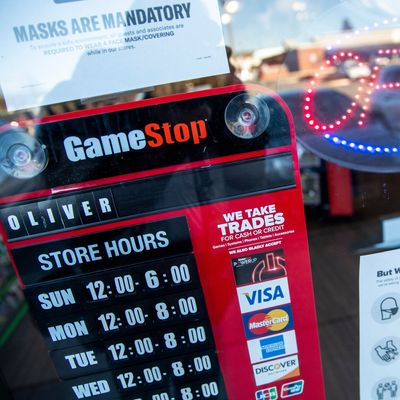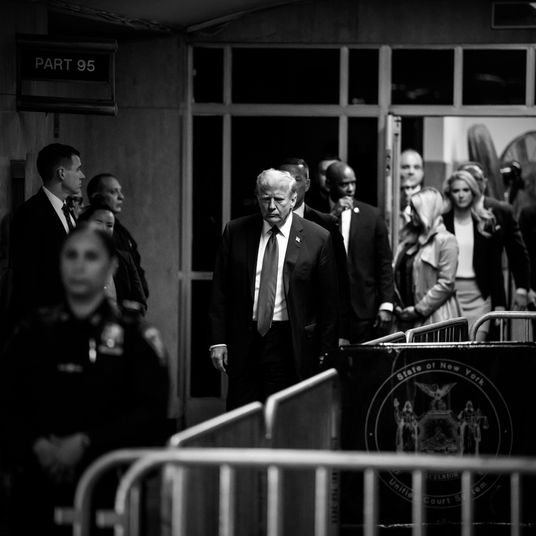
Robinhood is a stock-trading app that exists to “democratize finance” — but will also, on occasion, prohibit you from buying stocks because democratically unaccountable experts have declared them overpriced.
This was the befuddling message that Robinhood sent to its readers Thursday morning, as the most befuddling stock craze in modern memory pushed the price of a GameStop share above $440.
As of this writing, the GameStop rally appears to be fading. But the questions the phenomenon has raised — about the ethics of gamified stock-trading apps, the inequalities between large and small investors, how share prices are actually determined, and what the stock market is for — seem to grow more numerous and vexing by the hour.
Fortunately, Chris Arnade may have some answers. The former bond trader spent two decades on Wall Street before growing disillusioned with his profession’s culture of cynicism and greed. In recent years, he’s invested the bulk of his time into photography and writing, typically about social class and poverty in the U.S. But he’s hedged these productive activities with no small amount of leisurely lurking on Reddit. Which makes his brain all the more fit for picking.
Intelligencer spoke with Arnade Thursday about how Robinhood’s banning of GameStop spotlights the fraudulence of the “free market,” why Reddit’s GameStop bulls would be hailed as geniuses on Wall Street (if they only had the proper credentials), and what “the trickle-down corruption of the rich” is doing to American culture, among other things.
You wrote on Twitter Wednesday, “The Reddit horde through collective action is doing to hedge funds what hedge funds do to normal investors all the time.” What do you mean by that?
Hedge funds can operate in a few different ways. But a classic one is to take a position and then “talk your book.” So, you go to Davos, go to dinner at investment conferences, and use all the knowledge you gather from these conversations with government officials and other investors to put on a trade. And you execute that trade in a way that gets you the most bang for your buck by exploiting complex financial products and what we call “technicalities” in the market: the way other people are positioned, the holdings people have. Then you go on CNBC, send out morning newsletters, send out direct messages via Bloomberg to your friends, and sell everyone on your trade.
That’s applauded behavior on Wall Street. You’re outsmarting the room, and you’re telling people that you’re outsmarting the room. In many ways, that’s what happened on Reddit over the course of the last six months. But it wasn’t done by one firm; it was done by 2.3 million self-described degenerates.
And they really did both: They took a position, and they talked their book! Somebody actually laid out a pretty good presentation on why GameStop was undervalued, a presentation that would have gone down pretty well in hedge-fund circles a while back. And then they built on that and they all piled in. They did it in a very clever way to take advantage of the positioning of Wall Street.
Is it possible to briefly summarize what made their trade clever (in a way that a lay reader would understand)?
They did it through “call options.” Which is when you buy the right to purchase a stock at a set price within a specific time period. So let’s say GameStop was trading at $20 a share. The Redditors would buy a call option that gives them the right to buy a GameStop share for $50 at some point in the near future. And you can buy that very cheap because no one thinks the price of a GameStop share is ever going above $50. The broker dealers will sell the call options at a low price because they think it’s a low-probability event. But the Redditors know it is not a low probability event because they are going to push up the stock.
Now, broker dealers don’t want to take risks, contrary to what a lot of people seem to think. They don’t want to be betting that GameStop shares won’t rise above $50. So when they sell the call options, they hedge their risk. And they do that by buying their own GameStop shares, so they get some benefit if the stock somehow rises past $50. But it seems like a small risk. So if they sold a call option for 100 shares, they’ll only buy five or ten.
Then Redditors start running up the price. Suddenly, the broker dealers have to buy more GameStop stock to cover their risk. But when they do that, the stock price goes up even further. It becomes what is called a “gamma squeeze.” And the Redditors also know — as you wrote in your piece — that a lot of major players were shorting GameStop. So they knew they could get a short squeeze going, which sets off additional buying across the spectrum by hedge funds who were short and then by bankers who got stuck in a gamma squeeze and had to protect their hedges. So it just sets off to the moon.
That’s all considered fair game on Wall Street. That cleverness is rewarded. It’s why the hedge-fund people get paid the big bucks.
Do you think the Reddit investors knew what they were doing?
That’s not clear to me. I think they just realized that they could get a lot of bang for their buck by buying call options. And then I think a few noticed, “Hey, as we drive the price up, this is going to make them have to buy more and then it’s going to become a self-fulfilling prophecy.” However it happened, what the Reddit crowd did collectively was a smart trade. It’s the kind of thing that would win you admiration on Wall Street.
To play devil’s (i.e., hedge fund’s) advocate: When hedge funds execute clever feats of market manipulation, the losers are generally other rich people. By contrast, when charismatic Reddit posters (who got in on the GameStop trade early) try the same maneuver, they do so by encouraging a bunch of non-wealthy amateur investors to pile into a trade that many likely do not understand. So the losers are potentially less insulated against financial strife. That at least seems to be the sort of distinction that those tut-tutting WallStreetBets on CNBC want to draw. Is there something to that paternalistic argument?
I think that actually gets to the heart of it: Either you believe in the free market or you don’t. To be clear, I don’t. I’m not suggesting that what the hedge funds do is legitimate and therefore what Reddit’s doing is legitimate. I’m saying you have to apply your standards equally. I’m not particularly happy, personally, that Reddit is copying the hedge funds. I wish the hedge funds would stop doing what they’re doing. But if it’s legal for the hedge funds, you can understand why people on Reddit would be outraged when people act like it’s not legal for them to do the same.
The ideology of Wall Street is libertarianism. It’s that people have agency and should be allowed to exercise it. It’s a non-paternalistic worldview. It’s “Everyone is out for themselves, and the reason we make money isn’t because we’re more selfish, it’s because we’re smarter.” If that’s your attitude, fine. That’s not my attitude. I think Wall Street’s ethos — “Profits at all costs, everything is a market, the world is casino, I just want to make my money so I can buy my nuggets” — is really negative. I don’t like that the corrupt attitude of the rich has trickled down. But if the rich are going to be able to play this game, then why are you surprised when the less rich start playing?
I suspect I know your answer but: Was it wrong for Robinhood to prohibit its users from buying GameStop shares (ostensibly to prevent its amateur user base from losing lots of money by buying near the peak of a bubble)?
Yeah. I think it was. Look, I don’t think this is all going to end well. I think when the dust clears, you’ll probably see that there wasn’t a net transfer of wealth from Wall Street to retail investors but a transfer of wealth from Wall Street to Wall Street, from some firms to other firms. But you’ve got two choices here in my mind. The first, which I would prefer, is to regulate all of Wall Street, so that the intellectual grifting that’s legitimized by the credentialed class is taken down a notch and the Redditors get regulated too. Or you can deregulate and let the Reddit crowd do what it’s doing: admit that they’re a new player, and as legitimate as you. It’s the hypocrisy that’s frustrating.
What’s the cost of paternalistic hypocrisy in your view? That it serves to delegitimize the system and fuels populist backlash? Or is it just about the principle?
It’s ultimately self-defeating because everything you do to try to stop these people, it’s only going to make them more cynical and more convinced that the system is rigged and, consequently, more prone to doing things that are just fun. Stuff that the elites view as disruptive. When the system is so blatantly unfair, people are going to get madder and madder. It’s making me madder, and I got it pretty good. I shouldn’t be sitting here getting angry over this, but they’re making me want to root more for the Reddit crowd. Stop doing this. Be fair, man.
I think what the “credentialed class,” in your phrase, finds scandalous about the Redditors’ trade isn’t just that the people making it are uncouth outsiders but also that the specific “short squeeze” they’re running is almost satirical: It makes a mockery of the notion that the price of a company’s stock is determined by its “fundamentals” — by rational estimates of its earnings potential based on its net income and the health of its industry. GameStop shares didn’t soar because brick-and-mortar video-game retail became a better business proposition. They soared because GameStop became a “meme.” And once you demonstrate that this can happen, it raises the possibility that mere narratives and groupthink are driving valuations across the stock market, if less egregiously. Do you think that WallStreetBets is undermining the rationality of financial markets, or rendering their irrationality more visible, in the way that a caricature illuminates the flaws in a human face?
I think you just said it perfectly. It’s a caricature. One of the dirty secrets of investing on Wall Street is that you just have to get people to buy your story. Most prices are largely untethered to “value,” in my view. Value is a hard-to-define word anyway. But the credentialed class, professionals, the legitimate people, have defined the legitimate way to value GameStop, or the legitimate way to value Nike. And we’re going to play the game by those rules. And we go on CNBC, and we go to Davos, and we go to investor conferences, and we go to IMF conferences to build up that story, to build up that valuation narrative.
And we, the investors, all go out to dinner, and we all come to a conclusion that this is the way it should be valued. And we all jump in. It’s very much like a Reddit thing. We all agreed to do this. That’s what I think is missing from a lot of stories. A lot of people on Wall Street have the same trades on. They all come to the same conclusion. There’s money being moved around as people fight over this and that, but in general, for what I did, with macro trading, almost everybody has the same positions on. So when Long-Term Capital Management blew up in 1998, everybody lost because everybody had the same position. Same thing in ’07 with the financial crisis. Everybody blew up, because they all had the same trades on; because they’d all come to the same conclusion; because they’d all basically done the equivalent of what the Redditors did.
But where we’re different from the Redditors: We think there really is an underlying thing called value and that we can know it. One of the amazing things about this GameStop rally is that they exposed our notion of value as a fraud. So a lot of people looked at GameStop when it was at $20 and said, “There’s absolutely no fucking way it’s going to go to $40. But there’s really, really no fucking way it’s going to go to $120. The idea that it’s at $120 is just absurd. According to our valuation model, that would make GameStop as valuable as Ford or GM. There is no way that stock can do that.”
And the Redditors said, “Who cares? I don’t care about your equations. I don’t care about your valuation models. I’m going to make the price go up because all it is to me is a number on the screen.” So they just stripped all the pretense out of Wall Street and used that to expose it and to screw it. I think that’s going to have long-term consequences. When all this settles down, people are going to have to be much more cautious about where things can go, much more cautious about saying “This can’t go to X because that doesn’t fit my model.” Because once you just don’t care about value, or once you stop pretending to care about value — once you see it for the fraud that it is — the price can go wherever it wants.
You were a trader on Wall Street for 20 years before exiting the industry, having grown so disillusioned with your vocation that you now identify as a socialist. Did that disillusionment reflect changes in the culture or practices of the financial industry, or just your own exhaustion with the way things always were?
It was a little bit of both. There were definitely changes in the culture. I think people have a hard time believing that back in the ’80s, Wall Street actually had a sense of fiduciary responsibility to their clients. But it did because of localism. There was more of a connection between firms, the financial products they offered, and the immediate community they served.
Now, there is an asset-backed security. You can trade an asset-backed security and literally not know who those loans were made to. You don’t know who the person impacted is. There’s 30 layers between you and the end result. So it just becomes a game. It really is just this game. You’re just flipping numbers on the screen.
I think that’s what kind of fascinates me about this whole thing. The Reddit crowd embraced the cynicism of Wall Street, which treats everything just like a game, and they’ve taken it up and said, “Okay, this is a game. And I found a bug in the game.” They’re telling all their friends that there’s this game out there with a weak boss. And they’re going to attack that boss. Because they’re gamers. And gamers play.






























